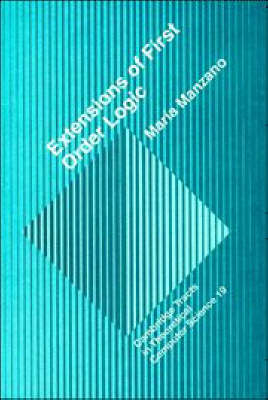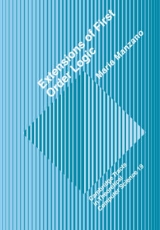
Extensions of First-Order Logic
Seiten
1996
Cambridge University Press (Verlag)
978-0-521-35435-6 (ISBN)
Cambridge University Press (Verlag)
978-0-521-35435-6 (ISBN)
- Titel erscheint in neuer Auflage
- Artikel merken
Zu diesem Artikel existiert eine Nachauflage
Classical logic has proved inadequate in various areas of computer science, artificial intelligence, mathematics, philosopy and linguistics. This is an introduction to extensions of first-order logic, based on the principle that many-sorted logic (MSL) provides a unifying framework in which to work.
Classical logic has proved inadequate in various areas of computer science, artificial intelligence, mathematics, philosopy and linguistics. This is an introduction to extensions of first-order logic, based on the principle that many-sorted logic (MSL) provides a unifying framework in which to place, for example, second-order logic, type theory, modal and dynamic logics and MSL itself. The aim is two fold: only one theorem-prover is needed; proofs of the metaproperties of the different existing calculi can be avoided by borrowing them from MSL. To make the book accessible to readers from different disciplines, whilst maintaining precision, the author has supplied detailed step-by-step proofs, avoiding difficult arguments, and continually motivating the material with examples. Consequently this can be used as a reference, for self-teaching or for first-year graduate courses.
Classical logic has proved inadequate in various areas of computer science, artificial intelligence, mathematics, philosopy and linguistics. This is an introduction to extensions of first-order logic, based on the principle that many-sorted logic (MSL) provides a unifying framework in which to place, for example, second-order logic, type theory, modal and dynamic logics and MSL itself. The aim is two fold: only one theorem-prover is needed; proofs of the metaproperties of the different existing calculi can be avoided by borrowing them from MSL. To make the book accessible to readers from different disciplines, whilst maintaining precision, the author has supplied detailed step-by-step proofs, avoiding difficult arguments, and continually motivating the material with examples. Consequently this can be used as a reference, for self-teaching or for first-year graduate courses.
1. Standard second order logic; 2. Deductive calculi; 3. Categoricity of second order peano arithmetic; 4. Frames and general structures; 5. Type theory; 6. Many-sorted logic; 7. Applying MSL.
| Erscheint lt. Verlag | 29.3.1996 |
|---|---|
| Reihe/Serie | Cambridge Tracts in Theoretical Computer Science |
| Verlagsort | Cambridge |
| Sprache | englisch |
| Maße | 179 x 254 mm |
| Gewicht | 999 g |
| Themenwelt | Geisteswissenschaften ► Philosophie ► Logik |
| Mathematik / Informatik ► Mathematik ► Logik / Mengenlehre | |
| ISBN-10 | 0-521-35435-8 / 0521354358 |
| ISBN-13 | 978-0-521-35435-6 / 9780521354356 |
| Zustand | Neuware |
| Haben Sie eine Frage zum Produkt? |
Mehr entdecken
aus dem Bereich
aus dem Bereich
ein Gegenentwurf zum kurzfristigen Denken : so werden wir zu den …
Buch | Hardcover (2023)
REDLINE (Verlag)
18,00 €



